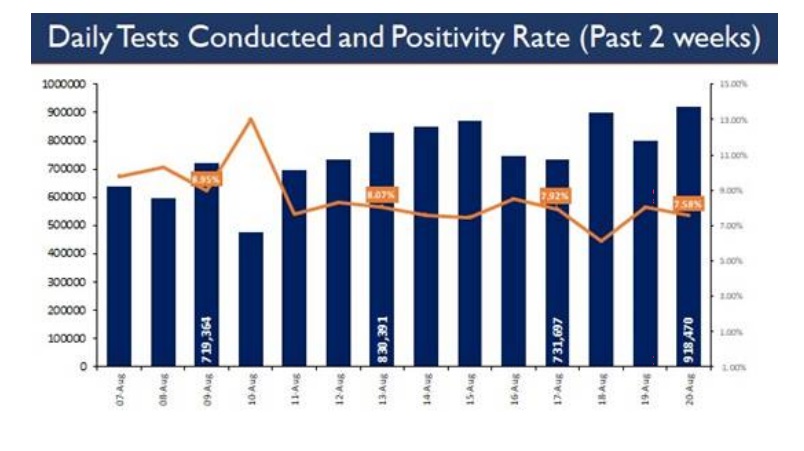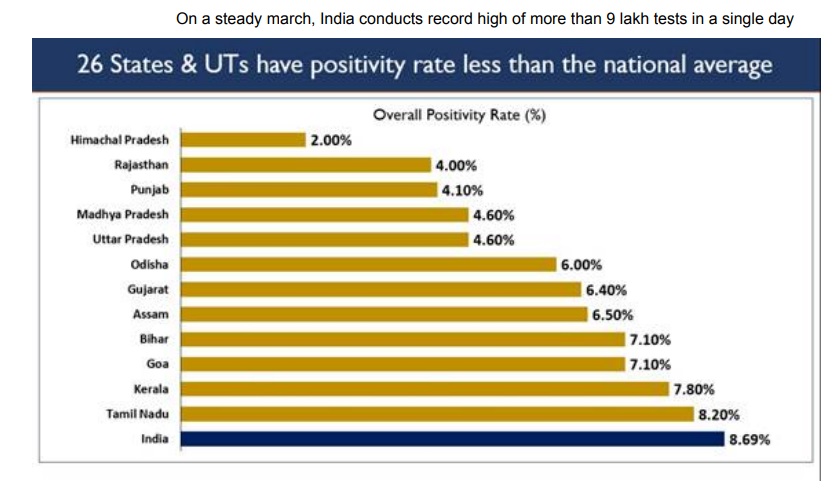On the path of a steady rise, India has scaled a new peak in daily testing.
For the first time, a record number of more than 9 lakh COVID tests have been conducted in a single day. With
9,18,470 COVID-19 tests done in the last 24 hours, India is poised to see an exponential increase towards its
resolve of testing 10 lakh samples daily.
With this achievement, the cumulative tests are more than 3.25 crore (3,26,61,252).
Expanded diagnostic lab network across the country and effective measures to facilitate easy testing have
given a substantial boost to the present numbers. As a result of these focussed actions, the Tests Per Million
(TPM) have seen a sharp increase to 23668. The TPM continues to maintain the constant upward trend.
With constantly increasing testing numbers, there has been a commensurate fall in the positivity rate. Although
higher number of tests will push the positivity rate initially, but as the experience from several States/UTs has
amply depicted, it will eventually lower when combined with other measures such as prompt isolation,
effective tracking and timely clinical management.


As the national average falls below 8%, there are 26 States/UTs that are reporting lower rates than the national average.
There has been a steady rise in the national network of diagnostic labs too. With 977 labs in the government sector and 517 private labs, the lab infrastructure has been enhanced to 1494 labs today. These include:
• Real-Time RT PCR based testing labs: 764 (Govt: 453 + Private: 311)
• TrueNat based testing labs: 611 (Govt: 490 + Private: 121)
• CBNAAT based testing labs: 119 (Govt: 34 + Private: 85)
Innovating New Solutions Based on Clinical Need
Cardiovascular disease (CVD) remains the leading cause of death worldwide, but with proper interventions and post-procedural care, up to 80% of CVD-related deaths may be preventable . In India, CVD is the leading cause of mortality . According to the Global Burden of Disease study, the estimate of age-standardized CVD death rate of 272 per 100,000 population in India is higher than the global average of 235 per 100,000 population . To better understand growing treatment gaps in cardiovascular health care and identify new ways to continue addressing existing challenges, Abbott commissioned the Beyond Intervention survey to capture feedback from more than 1,400 physicians, health system administrators and patients to uncover their views on how data and technology could better guide physician decision making and improve patient outcomes.
Abbott has targeted gaps in vascular health care through technology development and deployment. By focusing on innovative approaches to patient management, including the deployment of new technology smart applications, remote monitoring and minimally invasive approaches, the company is improving patient care and working to address many of the issues identified by respondents to the Beyond Intervention survey.
In addition, the implementation of new visualization tools like Optical Coherence Tomography (OCT) imaging into percutaneous coronary intervention (PCI) workflows has driven better treatment decisions and ultimately led to improved patient outcomes. As a result, the company has helped enhance cardiovascular care and deliver maximum value to physicians, hospitals and patients alike by utilizing technology to improve patient care before initial treatment, during the procedure and during the post-treatment follow up.
Speaking on the value of technology, “Dr. Ashok Seth, President, Asia Pacific Society of Interventional Cardiology and Chairman, Fortis Escorts Heart Institute and Governance Board says, “Clearly advances in medical technology, especially in the last 20 years, research leading to evidence-based action plans and appropriate timing & choice of medical procedure, have helped in ensuring best outcomes for my patients in the long-term. I feel fortunate to be a part of that experience and to deliver the best results for patients. I believe the most important service I can do to my patients is not just to get them better, but importantly that they should remain well enough to not need any further interventions for the longest period of time. Advances in technology help me achieve this.”
Key Research Findings (India)
The Beyond Intervention research uncovered key views from physicians, hospital administrators and patients that showcase the demand for improved communication between physicians, hospital administrators and patients. Key findings from the research for India include:
Technology and the advancement in cardiovascular tools and practices continue to improve patient outcomes
Imaging tools topped the list of technologies enabling improved vascular care. Overall, tools like wearables, imaging, monitoring and AI-fueled technologies provide valuable information that physicians and administrators across regions deem necessary to provide a more precise intervention. Seventy-two percent Indian physicians, one of the highest in the survey, believe that advances in healthcare technology improve patient care by the ability to provide more accurate diagnosis. Amongst the most valuable tools and technologies, 60% of Indian physicians want patients to be more involved in their health through digital health trackers.
Data-driven healthcare system vital for efficient delivery and will enable a holistic treatment pathway
Inaccurate, insufficient and inappropriate use of data and lack of communication lead to gaps in accurate decisions. Nearly 50 percent physicians believe population health data is under-utilized. 96% Indian patients understand the benefits of health data collection for future generations and individual patient outcomes. Seventy percent of them want either the health system or the physicians to be responsible for their data. Seventy-two percent of patients viewed data that "lets my doctor see my problem and act on it in a tailored-for-me manner" as the number one priority. Fifty six percent patients in India highly value data that monitors how other patients like them have gotten well. Also, 65% patients want physicians to use data results collected from specific procedures or treatments to make personalized recommendations."
There are growing treatment gaps in cardiovascular health care before, during and after a cardiac procedure or intervention
Forty-four percent of physicians in India stated they have little time to spend with patients and 40% have little insight into aftercare and patient adherence, contributing to the growing gaps in patient care. Approximately 76% of Indian physicians believe at-risk patients can be better identified through greater connectivity between primary care providers and patients.
Patients increasingly want a personalized health care experience based on data
Patients want more individualized and personalized care, which include more face time with doctors to address questions, a two-way consultative relationship, and an individualized treatment plan based on both personal data and best practices from others with similar cardiovascular issues. Sixty six percent of Indian patients also said that their physician’s use of new technologies that monitor their progress and provide information to show that treatment is working is valuable.
Maneesh Juneja, Digital Health Futurist, UK says, "India is a diverse country which faces many challenges in vascular care. However, if we find a way to include different voices in the design and implementation of emerging technologies, we have the ability to overcome many of these challenges. Fostering a culture of greater collaboration within India is critical to ensure that many more people can continue to benefit from technological innovations in vascular care. Innovation needs people, process and policy to move in tandem."
About Beyond Intervention Research
Abbott surveyed 1,432 physicians, health system administrators and patients from December 2019 through January 2020 to understand the effect of advancements in cardiovascular technology on patient care. Respondents to the online survey represent nine countries: The United States, United Kingdom, China, Japan, France, Germany, India, Italy and Brazil. The Beyond Intervention market research uncovers the improved patient outcomes that can be achieved through technological innovation and improved data insights across a patient’s care journey. Data-driven decision making and collaboration between physicians, administrators and patients will improve overall patient treatment plans – from understanding risk factors and comorbidities to providing precise diagnoses to making the right treatment decisions that greatly improve wellness and quality of life.
About Abbott
Abbott is a global healthcare leader that helps people live more fully at all stages of life. Our portfolio of life-changing technologies spans the spectrum of healthcare, with leading businesses and products in diagnostics, medical devices, nutritionals and branded generic medicines. Our 107,000 colleagues serve people in more than 160 countries. In India, Abbott was established in 1910, and is one of the country's oldest and most admired healthcare companies. With over 12,000 employees in the country, Abbott in India is helping to meet the healthcare needs of consumers, patients and doctors throughout urban and rural India.
